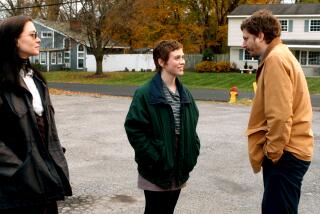Genuine ‘Two Family House’ Hits Full Scale of Emotions
Raymond De Felitta’s “Two Family House” is as fragile as a soap bubble--one falsemove and it bursts. That it never does only adds to its abundant pleasures, its rich, rueful humor, poignancy and tenderness.
Sharp judgments are demanded of De Felitta, acclaimed for his “Bronx Cheers” and “Cafe Society,” every step of the way. He avoids the crippling effect of self-consciousness through the sheer dint of his love for an enclave of Italian Americans living on Staten Island in 1956. Yet De Felitta’s love is never blind: People may be funny, but there’s nothing amusing to him or to us, only pain and regret, when they cannot or will not transcend their narrowest views.
Michael Rispoli’s Buddy Visalo, a warm teddy bear of a man, has more intelligence and imagination than his pals at Angie’s neighborhood bar. He realizes this truth about himself only partially, and his wife Estelle (Katherine Narducci) and his pals, far from seeing him as their superior, regard him, with affection, as a loser.
*
Buddy loves to sing and when no less than Arthur Godfrey hears him perform near the end of World War II, he tells Buddy to look him up after he gets out of the Army. Estelle, his bride, convinces him he’s aiming too high and talks him out of it.
Estelle, unimaginative and conservative, is so convinced of his ordinariness--indeed, she is so afraid of anything that’s not in keeping with her tight ethnic community that she cannot possibly see any potential in her husband. Buddy’s a machinist whose repeated failed attempts to go into business for himself constitute a perfect example of self-fulfilling prophecy.
Estelle finally allows Buddy to buy a run-down house in an Irish neighborhood, divided long ago into an upstairs and a downstairs apartment. He’ll turn the ground floor into a bar, and he and Estelle will at last be able to escape her parents’ home and live upstairs. The hitch is that it proves difficult for him to evict the Irish immigrant couple living upstairs (the downstairs apartment being derelict and abandoned).
Jim O’Neary (Kevin Conway) is a stubborn, raucous drunkard whose lovely wife Mary (Kelly Macdonald), young enough to be his daughter, is about to give birth. Proud and defiant, Mary nevertheless touches Buddy’s heart; he is not about to throw her into the street, and when she gives birth to a baby boy, this will unexpectedly and profoundly alter the course of Buddy’s life, not to mention that of Mary and her baby.
Buddy starts to think for himself, and we hope that he proves to be as courageous as he is big-hearted and open-minded; he will need to be, as he gradually comes into conflict with the entrenched, collective views of family and community. In Rispoli’s consummate playing, Buddy grows before our eyes; so does Mary, in the beguiling Macdonald’s equally persuasive portrayal.
*
As splendid as they are, Narducci has the toughest role, for she must show us that Estelle is basically a good woman, deserving of sympathy in many instances. Yet she must ultimately reveal Estelle’s best instincts being strangled by ignorance and prejudice in its crudest form. We feel pity rather than contempt for Estelle, no small feat and crucial to the film’s aiming toward illuminating rather than merely condemning.
De Felitta manages the film’s constant shifting between joy and sorrow, humor and anguish, and exudes such a sense of discovery in the alternating possibilities and limitations of human nature that his film avoids any sense of manipulation or contrivance, qualities certain to have emerged in lesser hands. “Two Family House,” winner of the audience award at Sundance, is a film of rare, delicate sensibility.
* MPAA rating: R, for language and brief sexuality. Times guidelines: Some of the language is highly bigoted in nature.
‘Two Family House’
Michael Rispoli: Buddy Visalo
Kelly Macdonald: Mary O’Neary
Katherine Narducci: Estelle Visalo
Kevin Conway: Jim O’Neary
A Lions Gate Films presentation. Writer-director Raymond De Felitta. Producers Anne Harrison, Alan Klingenstein. Executive producers Jim Kohlburg, Adam Brightman. Cinematographer Michael Mayers. Editor David Leonard. Music Stephen Endelman. Costumes Liz McGarrity. Production designer Teresa Mastropierro. Set decorator Dina Varan. Running time: 1 hour, 48 minutes.
At selected theaters.
More to Read
The complete guide to home viewing
Get Screen Gab for everything about the TV shows and streaming movies everyone’s talking about.
You may occasionally receive promotional content from the Los Angeles Times.






